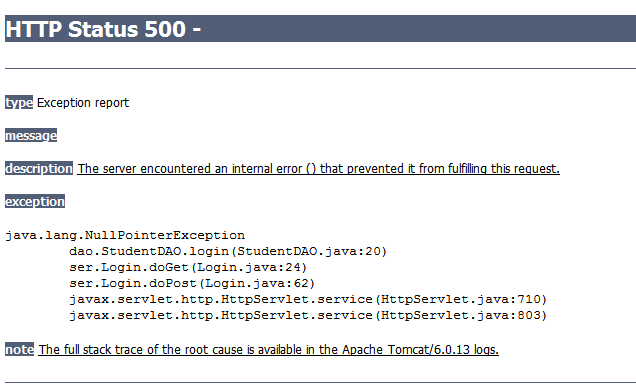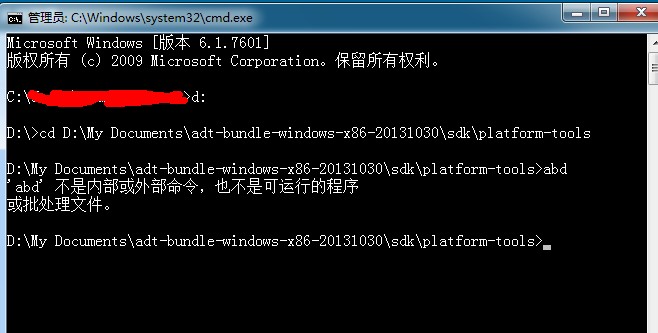急!StringReader读取字符串时长度不够的问题
本人用StringReader读取一个字符串,字符串长度为1100000以上,是一段标签。结果读取后长度小于原字符串长度(后面的部分被截掉了),请各位大侠支支招!小男子无以为报,愿以分相许!哈哈!注:可以考虑用其它方法,但必须将这个字符串放到一个Reader(如FileReader)里。 --------------------编程问答-------------------- 不上代码不太清楚你的问题出在哪 --------------------编程问答-------------------- StringReader用来读取的默认空间不够了? --------------------编程问答--------------------
2楼说的对,就是这个问题 --------------------编程问答-------------------- 楼主,那要看你的目的是什么了。
是否是读取这个标签再写到另一个文件中,还是读取这个标签使用。
第一种字节流可以,第二种BufferReader的readLine应该可以。 --------------------编程问答-------------------- 1100000
按理这点内存是不会不够的 --------------------编程问答-------------------- 这种情况可以分段处理,将其按照一定的长度分割为N段。。如长度1100000,可按照1万为一段。。分为110段。。然后处理。。。 --------------------编程问答--------------------
--------------------编程问答-------------------- 感谢各位的热心帮助,但还是没有找到思路,还是把代码贴一下吧:
看如下实例:
public static void main(String[] args) throws IOException {
FileWriter fileWriter = new FileWriter(new File("c:/test.txt"));
BufferedWriter bufferedWriter = new BufferedWriter(fileWriter);
for (int i = 0; i < 10000000; i++) {
bufferedWriter.write("12345678901234567890");
}
bufferedWriter.flush();
bufferedWriter.close();
FileReader fileReader = new FileReader(new File("c:/test.txt"));
BufferedReader bufferedReader = new BufferedReader(fileReader);
bufferedReader.skip(1000000l); //跳过长度-字节
char[] bs = new char[1];
bufferedReader.read(bs);
System.out.println(bs[0]);
}
API:http://www.gznc.edu.cn/yxsz/jjglxy/book/Java_api/java/io/BufferedReader.html
protected void doPost(HttpServletRequest request, HttpServletResponse response) throws ServletException, IOException{
request.setCharacterEncoding("utf-8");//注意编码
String type = request.getParameter("type");
String svg = request.getParameter("svg");//就是要读取这个字符串,稍短时没有问题
response.setCharacterEncoding("utf-8");
ServletOutputStream out = response.getOutputStream();
if (null != type && null != svg){
svg = svg.replaceAll(":rect", "rect");
String ext = "";
Transcoder t = null;
if (type.equals("image/png")) {
ext = "png";
t = new PNGTranscoder();
} else if (type.equals("image/jpeg")) {
ext = "jpg";
t = new JPEGTranscoder();
} else if (type.equals("application/pdf")) {
ext = "pdf";
t = new PDFTranscoder();
} else if (type.equals("image/svg+xml")) {
ext = "svg";
}
response.addHeader("Content-Disposition", "attachment; filename=chart."+ext);
response.addHeader("Content-Type", type);
if (null != t){
StringReader sr = new StringReader(svg); //问题出在这儿,由于svg太长而被截取
TranscoderInput input = new TranscoderInput(sr);
TranscoderOutput output = new TranscoderOutput(out);
try {
t.transcode(input,output);//在此处抛出了异常
} catch (TranscoderException e){
out.print("编码流错误.");
e.printStackTrace();
}
} else if (ext == "svg"){
svg = svg.replace("http://www.w3.org/2000/svg", "http://www.w3.org/TR/SVG11/");
out.print(svg);
} else {
out.print("Invalid type: " + type);
}
} else {
response.addHeader("Content-Type", "text/html");
}
out.flush();
out.close();
}
}
--------------------编程问答--------------------
--------------------编程问答-------------------- StringReader sr = new StringReader(svg); //问题出在这儿,由于svg太长而被截取
Transcoder svg的处理。。没有做过。。不能确定能不能分段处理。。
不过LZ可以试试:
String svg = request.getParameter("svg");
传过来的svg参数,在传递的时候可以检查固定长度。。然后分段传递一个数组类型的过来,,程序接收数组类型的多段字符串片段。。。
StringReader sr = new StringReader(svg);
TranscoderInput input = new TranscoderInput(sr);
这里在循环将每个片段包装。。
t.transcode(input,output); // 这里看能否将所有片段组合进去。。
想办法确认一下这里被截取是不是因为jvm内存不足引起,比如用java.lang.Runtime类的一些方法 --------------------编程问答--------------------
肯定不是jvm问题,svg打印出来是完整的,但用StringReader读取时被截断了 --------------------编程问答-------------------- 估计还是你转换类内部读取的问题,StringReader代码很简单,出错机会都没有
/*--------------------编程问答--------------------
* Copyright (c) 1996, 2005, Oracle and/or its affiliates. All rights reserved.
* ORACLE PROPRIETARY/CONFIDENTIAL. Use is subject to license terms.
*
*
*
*
*
*
*
*
*
*
*
*
*
*
*
*
*
*
*
*
*/
package java.io;
/**
* A character stream whose source is a string.
*
* @author Mark Reinhold
* @since JDK1.1
*/
public class StringReader extends Reader {
private String str;
private int length;
private int next = 0;
private int mark = 0;
/**
* Creates a new string reader.
*
* @param s String providing the character stream.
*/
public StringReader(String s) {
this.str = s;
this.length = s.length();
}
/** Check to make sure that the stream has not been closed */
private void ensureOpen() throws IOException {
if (str == null)
throw new IOException("Stream closed");
}
/**
* Reads a single character.
*
* @return The character read, or -1 if the end of the stream has been
* reached
*
* @exception IOException If an I/O error occurs
*/
public int read() throws IOException {
synchronized (lock) {
ensureOpen();
if (next >= length)
return -1;
return str.charAt(next++);
}
}
/**
* Reads characters into a portion of an array.
*
* @param cbuf Destination buffer
* @param off Offset at which to start writing characters
* @param len Maximum number of characters to read
*
* @return The number of characters read, or -1 if the end of the
* stream has been reached
*
* @exception IOException If an I/O error occurs
*/
public int read(char cbuf[], int off, int len) throws IOException {
synchronized (lock) {
ensureOpen();
if ((off < 0) || (off > cbuf.length) || (len < 0) ||
((off + len) > cbuf.length) || ((off + len) < 0)) {
throw new IndexOutOfBoundsException();
} else if (len == 0) {
return 0;
}
if (next >= length)
return -1;
int n = Math.min(length - next, len);
str.getChars(next, next + n, cbuf, off);
next += n;
return n;
}
}
/**
* Skips the specified number of characters in the stream. Returns
* the number of characters that were skipped.
*
* <p>The <code>ns</code> parameter may be negative, even though the
* <code>skip</code> method of the {@link Reader} superclass throws
* an exception in this case. Negative values of <code>ns</code> cause the
* stream to skip backwards. Negative return values indicate a skip
* backwards. It is not possible to skip backwards past the beginning of
* the string.
*
* <p>If the entire string has been read or skipped, then this method has
* no effect and always returns 0.
*
* @exception IOException If an I/O error occurs
*/
public long skip(long ns) throws IOException {
synchronized (lock) {
ensureOpen();
if (next >= length)
return 0;
// Bound skip by beginning and end of the source
long n = Math.min(length - next, ns);
n = Math.max(-next, n);
next += n;
return n;
}
}
/**
* Tells whether this stream is ready to be read.
*
* @return True if the next read() is guaranteed not to block for input
*
* @exception IOException If the stream is closed
*/
public boolean ready() throws IOException {
synchronized (lock) {
ensureOpen();
return true;
}
}
/**
* Tells whether this stream supports the mark() operation, which it does.
*/
public boolean markSupported() {
return true;
}
/**
* Marks the present position in the stream. Subsequent calls to reset()
* will reposition the stream to this point.
*
* @param readAheadLimit Limit on the number of characters that may be
* read while still preserving the mark. Because
* the stream's input comes from a string, there
* is no actual limit, so this argument must not
* be negative, but is otherwise ignored.
*
* @exception IllegalArgumentException If readAheadLimit is < 0
* @exception IOException If an I/O error occurs
*/
public void mark(int readAheadLimit) throws IOException {
if (readAheadLimit < 0){
throw new IllegalArgumentException("Read-ahead limit < 0");
}
synchronized (lock) {
ensureOpen();
mark = next;
}
}
/**
* Resets the stream to the most recent mark, or to the beginning of the
* string if it has never been marked.
*
* @exception IOException If an I/O error occurs
*/
public void reset() throws IOException {
synchronized (lock) {
ensureOpen();
next = mark;
}
}
/**
* Closes the stream and releases any system resources associated with
* it. Once the stream has been closed, further read(),
* ready(), mark(), or reset() invocations will throw an IOException.
* Closing a previously closed stream has no effect.
*/
public void close() {
str = null;
}
}
仅凭这个能说明什么呢,能说明到svg完整打印内存是足够的
这里并没有排除内存不足的可能性 --------------------编程问答-------------------- 等待高手的出现 --------------------编程问答-------------------- --------------------编程问答-------------------- 1.StringReader sr = new StringReader(svg)
这行代码之前打印svg.length()确认svg长度,
之后使用
int i=0;
while (sr.read()!=-1) {
i++;
}
打印i确认sr中包含字符串的长度。
2.如果确认以上两个长度不相等,那就是StringReader类的bug了……这种java已建立多年的类,这样的概率有多大?经本人测试,jvm的Xmx=1024m下,字符串长度1000000000,StringReader并不会截断。
3.如果相等,那要么是jvm内存问题,可调整jvm尝试,要么是楼主自己的类的内部转换问题。 --------------------编程问答-------------------- 建议把t.transcode(input,output)的内部代码贴出来,严重怀疑是这里面的问题……
1100000长度不大可能内存不足,即使jvm内存不足,也不会截断,直接溢出了 --------------------编程问答-------------------- 遇到同样的问题,很常的字符串被截取了,高手赶紧来支招吧,不是内存问题呀。
补充:Java , Java EE



